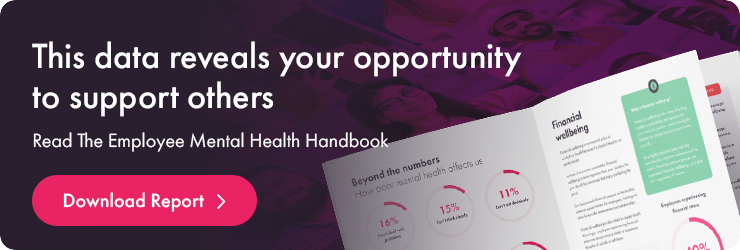Poor employee mental health is a significant challenge facing organisations and the situation has only worsened during the COVID-19 pandemic.
With employee wellbeing statistics revealing the shocking scale of the problem, it’s essential that organisations take the right steps to support their employees’ mental health.
Spotting mental health issues at work can be challenging and providing effective support for these employees equally so. That’s why it’s important to identify the needs of each individual employee and the ways that you, as an organisation, can help them.
Reasonable adjustments – changes to the workplace or the work practices of an employee that enable them to do their job – are a key part of this support system.
Choosing the correct adjustment is vital to ensure effective support for each employee, but research suggests that organisations are struggling.
While 77% of employees believe that their organisation promotes good mental wellbeing, they are much less positive regarding the ability of their organisation to actually support and assist with their mental health.
This guide will introduce you to reasonable adjustments for mental health and provide you with 10 effective adjustments you can make for your employees.
- Who is eligible for reasonable adjustments?
- Why make reasonable adjustments for mental health?
- Can reasonable adjustments be removed?
- Reasonable adjustments for mental health
- Take a flexible approach to working hours
- Provide the option to work from home
- Manage work volume
- Consider the physical working environment
- Provide increased supervision
- Increase support from other members of staff
- Offer training
- Create a compassionate culture
- Phase their return to work
- Consider job redeployment
Who is eligible for reasonable adjustments?
A person is eligible for reasonable adjustments if they have a mental or physical impairment that has a substantial long-term effect on their normal day-to-day activities.
People who are eligible may include people with mental illnesses such as depression, anxiety or OCD.
“It’s essential that organisations are creating workplaces that work for everyone, regardless of their personal situation,” adds Harry Bliss co-founder of Champion Health
Why make reasonable adjustments for mental health?
Making reasonable adjustments to help your employees makes sense from a moral, legal and business perspective.
Firstly, the moral angle. Everyone should have a fair opportunity to succeed in the working environment, regardless of their situation. This includes people who are struggling with their mental health.
Then there are the legal considerations. Mental health is considered a disability if it has a long-term effect on the day-to-day activities of your employees.
If this is the case, then you have a legal obligation to support them. Once you are aware of any disability, the 2010 Equality Act dictates that you must make reasonable adjustments to support your employees.
Research by Deloitte found that poor mental health costs UK employers up to £45 billion every year. By taking the right steps to support your employees, you can significantly reduce these costs, while cultivating a happier, more productive workforce, built on a compassionate culture.
Can reasonable adjustments be removed?
Reasonable adjustments can be arranged on a temporary or permanent basis – this decision ultimately lies with the manager. That said, it’s recommended that you work closely with the employee when making those decisions, as they are the ones who are best-placed to advise you on this.
If you remove reasonable adjustments before an employee is ready, it may be viewed as discriminatory behaviour, akin to failing to provide reasonable adjustments in the first place.
Reasonable adjustments for mental health
Here are 10 reasonable adjustments you can make for employees suffering from mental ill-health:
1. Take a flexible approach to working hours
An effective way to help someone struggling with mental health is to take a flexible approach to their working hours. This may include:
- Agreeing a reduction in working hours
- Allowing flexible start and finish times
- Allowing the employee to take some time off (either paid or unpaid) to attend medical appointments
- Granting frequent or longer rest breaks
Research shows that most employees are extremely appreciative of the opportunity to be flexible with their working hours. One study revealed that 97% of employees felt that having a more flexible job would have a positive impact on their quality of life.
2. Provide the option to work from home
Research by Deloitte found that 61% of employees would prefer the option to work from home more often. This is because working remotely can reduce a lot of the stress surrounding working, like the commute, the lunch rush and time spent away from family members.
Giving your employees the option to work from home is also a great way to show them that you trust them to work well when left to their own devices.
Displaying this trust doesn’t just help your employees, it helps your business too. Research by the Harvard Business Review showed that employees who feel trusted are less stressed, more engaged and more productive.
3. Manage work volume
Managing work volume can be difficult for employees, especially if they struggle to focus, or tend to take on too much work.
Take steps to help these employees manage their workload, such as:
- Reducing the volume of work they are dealing with, potentially by reassigning tasks to other members of staff
- Work with the employee to help them prioritise certain pieces of work and manage their time
- Offering the employee training in workload management
According to CIPD, workload is the most common cause of work-related stress. So, helping struggling employees manage their workload can be an extremely reasonable adjustment for mental health.
4. Consider their physical working environment
The physical environment people work in can have a significant impact on their mental health.
A good example of this is noise levels – some employees may find it difficult to work in a noisy environment, whereas some may prefer the social hub of the office to a private busy.
Discuss with your employee how the environment they’re working in may be affecting their mental health, and the changes you could take to mitigate this. These could include:
- Providing a quiet space to work, away from distraction such as ringing telephones
- Making sure their workplace is ergonomically healthy (this is something to be particularly aware of if the employee is working from home)
- Offering a reserved parking spot, so they can drive to work rather than taking public transport
5. Provide increased supervision
Increasing the provision of one-to-one support may help struggling employees feel more supported. It also means you can help the employee stay on track, and quickly step in if they are struggling.
You should make it clear to the employee that the purpose of your increased contact is to support them, not to micro-manage them.
As part of this supervision, offer constructive feedback, praising the employee when they do a good job, and allaying their concerns when they have encountered a difficult situation.
Another way you can support them is to try and help them manage their mental health issue. For example, if you know someone is struggling to manage stress, read up on ways help employees manage stress.
6. Increase support from other members of staff
The responsibility for supporting struggling employees doesn’t have to fall solely on the manager. Utilise the expertise and positions of other staff to help support the struggling employee.
This could involve implementing a mentoring system, a buddy system, or even just assigning a member of staff (preferably one with a strong relationship to the employee) to support them with their work.
7. Offer training
Offering your staff increased training may put them in a better position to deal with the issues that are causing them stress.
This is particularly helpful for employees who are struggling to manage their workload, or who are finding some situations stressful, like tough client calls.
Training is also a useful tool for employees who are returning to work, or starting a new role, as it can help to build their confidence.
8. Develop a compassionate culture
Creating or developing a compassionate culture, particularly surrounding mental health issues can be way to provide support for those who are struggling. Failure to do so may undermine some reasonable adjustments that would otherwise have been effective.
Therefore, it is vital that you make an effort to foster understanding and openness around mental health within your team. You can do this by:
- Creating clear policies surrounding mental health and how issues are dealt with
- Encouraging leaders to open up about their mental health
- Providing resources and training to raise awareness of mental health issues
Often, the first step to developing a compassionate culture that understands mental health is to start the conversation. However, that’s not always easy. For tips, read our guide on how to talk about mental health at work.
9. Phase their return to work
If an employee has taken time off due to a mental illness, it’s unrealistic to expect them to always work full time immediately upon their return.
Consider phasing their return to work, starting them off with reduced hours and familiar tasks, and building up from there.
It should always be discussed with the employee what the phased return will involve. The focus should be on them, and what they feel they can manage.
10. Consider job redesign or redeployment
In some cases, there may be no adjustments which will enable the employee to continue in their role as it currently is.
If this is the case, consider trying to redesign their current role to make it more suitable to them, or redeploy them into another role.
This could be viewed as a reasonable adjustment but should not be considered without consulting the employee first.
Involve the employee
These reasonable adjustments for mental health will give you some inspiration, but remember that there is a vast range of adjustments you could make for mental health.
There are some of which will be less common than others, some which will only be appropriate for a small number of employees, and some that your company are uniquely positioned to offer.
When choosing from a wide range of potential adjustments, it is essential that you involve your employee in that decision. Nobody knows better than them what they need to perform at their best, so utilise their knowledge.
By doing this, you will increase your chances of choosing an adjustment that makes a significant and positive difference to their working situation.
Bring a proactive focus to mental health
The organisations who bring a proactive focus to supporting their employees are the ones who will achieve the best results.
As organisations and leaders, you should always be on the lookout for those employees who need support with their mental health. By getting into the habit of this, you will ensure you are well-placed to intervene when your employees need support.
By proactively looking out for your employees, discussing with them the support you can offer, and choosing the right reasonable adjustments, you can help create a workplace and a workspace that are built to allow employees to bring their best selves to work.
Employees remember how they are treated at critical moments in their career. Take the opportunity to show them how much you care.






